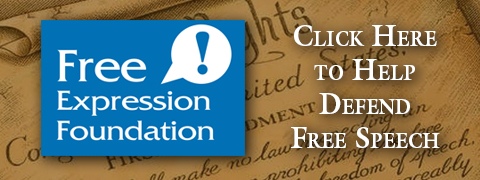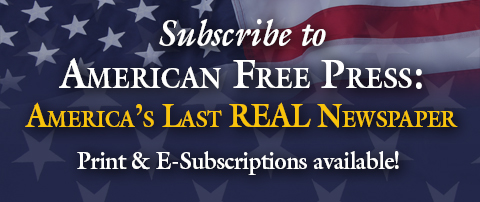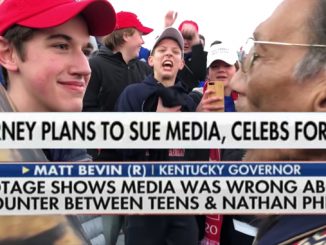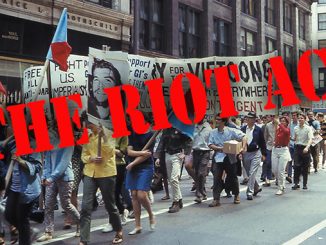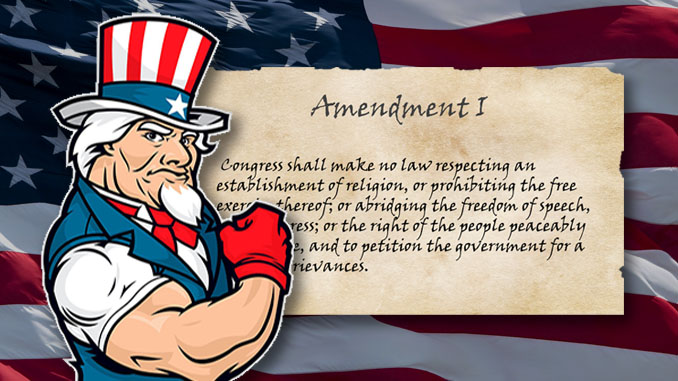
The Free Expression Foundation continues to fight for Americans’ free speech. Read below more about the organization’s recent efforts to support jailed protests and please consider how you can generously support FEF in this critical battle.
By Glen Allen, Esq.
There are overlapping networks of power in America today, run by savvy, active, unprincipled, ruthless people who give lip service to our robust free speech traditions but whose real aim is to prevent honest debate on controversial topics. Their modus operandi is to destroy those who dissent from the views they approve. They are highly skilled in crushing anyone who steps outside the narrow lines they draw. I know. I’m one of their victims—one of their many victims.
On Aug. 17, 2016, the Southern Poverty Law Center (SPLC) published a distorted “Hatewatch” article about me and made it a news story in dozens of newspapers around the country. Within two days I lost my job, my reputation was destroyed, and I became a pariah in the city and legal community The fact that I had worked zealously and ethically in my law practice and for the City of Baltimore was of no interest to the SPLC. Why would the SPLC care about such things? Its goal was to destroy a political nonconformist.
As it happened, about the time the SPLC attacked me, I had been reading a book that contained a Russian immigrant’s account of her life under the old Soviet regime. As I read that account again, I winced. Here is her account:
I look at the people who support the transformation of America in disbelief: They are destroying the very land that gave them so much opportunity. In the USSR, representatives of the Communist Party . . . were ingrained into every aspect of civilian, official, and military life. These political organizers controlled public order by observing the behavior and speech of every citizen. People who wanted a more secure and privileged life found it necessary to join the propaganda machine. In order to survive, citizens were silent out of fear of retaliation by the authorities.
I winced because I felt I was reading a description of what life is becoming here in America under the growing domination of thought control networks like the SPLC. I shook my head. Could this really be happening in America?
But it is happening, with ever-growing intensity. The critical question is: What shall we do about it? As Patrick Henry asked, shall we “lie supinely on our backs until our enemies have bound us hand and foot”? . . . [I]f we wish to be free, if we mean to reserve those inestimable privileges for which we have been so long contending, if we mean not basely to abandon the noble struggle in which we have so long been engaged . . . we must fight!”
I say we fight back. With your support, the FREE EXPRESSION FOUNDATION, INC. can be an effective means for doing so. Let’s not lie supinely on our backs but stand tall on our feet, and fight. Please give your most generous donation today using the form on the facing page.
Free Speech Group Files Brief in Support of Jailed Protesters
By Glen Allen, Esq.
The board of directors of the Free Expression Foundation (FEF) has asked that I explain the nature and importance of the amicus curiae brief that I, with a colleague, prepared and filed on behalf of FEF in the Fourth Circuit Court of Appeals in October in the United States v. Miselis, et al. case. It is my pleasure to do so.
Let me first describe the nature of an amicus curiae brief. “Amicus curiae” is a Latin term for “friend of the court.” An amicus curiae is someone who is not a party to a case, and who may or may not have been solicited by a party, who assists a court by offering information or legal arguments, typically presented in a brief, that bear on important matters presented in the case. Amicus briefs should not merely repeat arguments made by the parties but should bring to the court’s attention issues the parties may have not addressed or fully developed. Amicus briefs require either the consent of all the parties or the approval of the court.
The amicus brief FEF filed in October 2019 in the Miselis case fulfilled the proper function of such a brief. The momentous question before the court of appeals is the constitutionality of the Anti-Riot Act, under which three young members of the Rise Above Movement have been prosecuted and sentenced to several years in prison for their alleged involvement in the 2017 Charlottesville rallies. The defense counsels’ briefs developed their arguments that the Anti-Riot Act is unconstitutionally vague and overbroad. FEF, however, saw a need to address other facets of the act not addressed by defense counsel.
One of these was how American society has changed since the act was hastily passed into law in 1968. As FEF’s brief states:
The expansion of the internet and credit facilities have expanded the reach of the act into the mobile telephones in students’ backpacks and the home computer in nearly every home. A statute intended to curb outside agitators who wished to incite riots now reaches nearly all citizens as they go about their ordinary daily activities.
A second point FEF addressed involves the level of scrutiny a court should apply to its review of the act. The trial court had held that the act is content neutral and therefore not subject to exacting scrutiny. FEF contended to the contrary:
The act is in fact not content neutral but disfavors a critically important kind of speech: the kind that arouses fervid emotions and spurs people to organize demonstrations and counter-demonstrations, to travel sometimes considerable distances to those demonstrations, and to confront their adversaries in person.
Strict scrutiny of the act, FEF contended, is therefore required.
A third argument FEF presented is that the act violates the Hecklers’ Veto Doctrine, i.e., the doctrine articulated by the Supreme Court that listeners’ violent reactions to protected speech cannot be a basis for suppressing the speech. The government’s use of the Anti-Riot Act, FEF argues, gives enormous and illicit power to groups such as antifa to intimidate persons from attending controversial demonstrations.
Oral argument will probably be set in this important case in early 2020. It is unusual for amicus to be allowed to participate in oral argument, but I have nonetheless requested that I be allowed to participate. All persons concerned about free expression, especially free expression in demonstrations on controversial issues, should follow this case closely.
Note that FEF’s arguments in a California case helped sway a judge’s ruling that the Anti-Riot Act is unconstitutional. We hope to convince the judge in this “Charlottesville” case to see things the same way, though only time will tell if he will see reason or be swayed by pressure by political correctness or the rule of law.
Glen Allen is an attorney in Maryland. Last year, Allen filed a lawsuit against the Southern Poverty Law Center alleging that the radical left-wing organization, which is valued at over $450 million, targeted him in a smear campaign for the purpose of destroying his reputation and career. He is currently awaiting news from the court on when his case will proceed.

